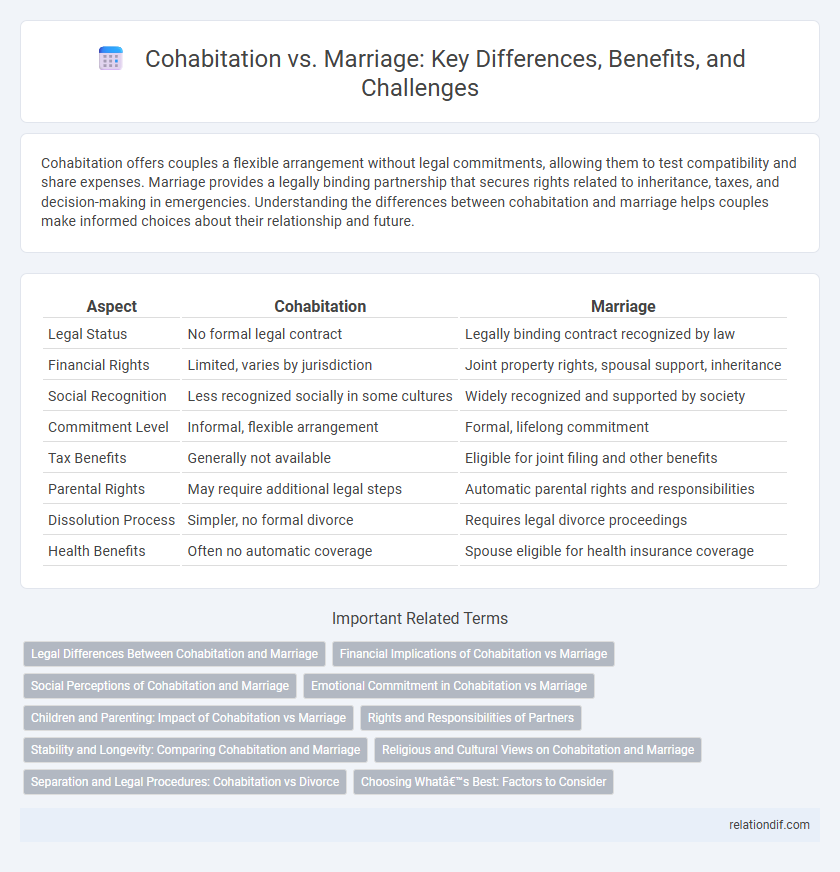Cohabitation offers couples a flexible arrangement without legal commitments, allowing them to test compatibility and share expenses. Marriage provides a legally binding partnership that secures rights related to inheritance, taxes, and decision-making in emergencies. Understanding the differences between cohabitation and marriage helps couples make informed choices about their relationship and future.
Table of Comparison
| Aspect | Cohabitation | Marriage |
|---|---|---|
| Legal Status | No formal legal contract | Legally binding contract recognized by law |
| Financial Rights | Limited, varies by jurisdiction | Joint property rights, spousal support, inheritance |
| Social Recognition | Less recognized socially in some cultures | Widely recognized and supported by society |
| Commitment Level | Informal, flexible arrangement | Formal, lifelong commitment |
| Tax Benefits | Generally not available | Eligible for joint filing and other benefits |
| Parental Rights | May require additional legal steps | Automatic parental rights and responsibilities |
| Dissolution Process | Simpler, no formal divorce | Requires legal divorce proceedings |
| Health Benefits | Often no automatic coverage | Spouse eligible for health insurance coverage |
Legal Differences Between Cohabitation and Marriage
Marriage grants legally binding rights such as joint property ownership, spousal inheritance, and tax benefits, which cohabitation typically does not provide. Couples who cohabit lack automatic legal recognition and must rely on contracts or wills to secure similar protections. Legal obligations in marriage include spousal support and decision-making authority in medical emergencies, whereas cohabitants usually need separate agreements to establish these rights.
Financial Implications of Cohabitation vs Marriage
Cohabitation typically lacks the legal financial protections and benefits that marriage provides, such as spousal Social Security benefits, tax deductions, and inheritance rights. Married couples often have access to joint health insurance plans, survivor benefits, and clearer division of assets in case of separation, which cohabiting partners may need to address through legal agreements. Financial stability in marriage is supported by established legal frameworks, whereas cohabitants face greater financial uncertainty without such formal protections.
Social Perceptions of Cohabitation and Marriage
Social perceptions of cohabitation often emphasize increased acceptance among younger generations who view it as a practical step before marriage, reflecting evolving cultural norms. Marriage is traditionally associated with long-term commitment, social stability, and legal recognition, which many societies still prioritize for validating relationships. Studies indicate that while cohabitation has gained legitimacy, marriage continues to carry symbolic weight linked to family structure and societal expectations.
Emotional Commitment in Cohabitation vs Marriage
Emotional commitment in marriage tends to be stronger and more publicly recognized due to formal vows and legal obligations, fostering a sense of security and long-term partnership. Cohabitation offers flexibility and emotional connection but often lacks the societal and legal reinforcement that deepens commitment levels in marriage. Studies indicate that married couples report higher emotional stability and mutual support compared to cohabiting partners.
Children and Parenting: Impact of Cohabitation vs Marriage
Children raised in married households tend to experience greater stability and consistent parenting practices compared to those in cohabiting families, which can reduce behavioral and emotional problems. Research indicates that married parents often have higher levels of commitment and cooperation, fostering a supportive environment crucial for child development. Cohabiting parents may face more challenges in long-term commitment and legal protections, impacting the overall well-being and security of their children.
Rights and Responsibilities of Partners
Cohabitation offers limited legal rights compared to marriage, with partners often lacking automatic access to benefits such as inheritance, spousal support, and joint health insurance. Married couples have clearly defined responsibilities, including shared financial obligations, decision-making authority in medical emergencies, and legal protections during separation or death. Understanding these distinctions is crucial for partners when choosing between cohabitation and marriage to ensure their rights and responsibilities are adequately protected.
Stability and Longevity: Comparing Cohabitation and Marriage
Marriage generally offers greater stability and longevity compared to cohabitation, with research indicating married couples experience lower rates of relationship dissolution. Cohabitation tends to have higher breakup rates, often attributed to less legal and social commitment. Studies show that the formal commitment in marriage fosters resilience and long-term relationship satisfaction.
Religious and Cultural Views on Cohabitation and Marriage
Religious doctrines across Christianity, Islam, and Judaism traditionally emphasize marriage as the sanctified union for cohabitation, often viewing living together outside wedlock as morally unacceptable. Cultural norms vary widely, with conservative societies prioritizing marriage for social legitimacy and family honor, while secular cultures increasingly accept cohabitation as a practical or ideological choice. These contrasting perspectives influence legal rights, social support, and community acceptance associated with cohabitation and marriage worldwide.
Separation and Legal Procedures: Cohabitation vs Divorce
Separation in cohabitation often lacks formal legal procedures, making asset division and custody agreements dependent on mutual negotiation or specific contracts like cohabitation agreements. Divorce, governed by family law, involves standardized legal processes such as court filings, mediation, and enforceable rulings on property, alimony, and child custody. The absence of legal recognition in cohabitation complicates enforcement, whereas marriage provides clearer legal protections and pathways during separation.
Choosing What’s Best: Factors to Consider
Choosing between cohabitation and marriage involves evaluating legal, financial, and emotional factors that impact long-term stability. Marriage provides legal benefits such as tax advantages, inheritance rights, and spousal protections often absent in cohabitation agreements. Emotional compatibility, shared goals, and communication quality also play critical roles in determining the most suitable commitment model for a couple's future.
Cohabitation vs Marriage Infographic

 relationdif.com
relationdif.com